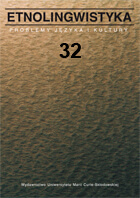Polska bieda w perspektywie etymologicznej, historycznojezykowej i dialektologicznej
The Polish bieda (poverty) from the perspective of etymology and historical linguistics
Author(s): Ilona Gumowska-GrochotSubject(s): Lexis, Semantics, Historical Linguistics, Sociolinguistics, Cultural Anthropology / Ethnology
Published by: Wydawnictwo Naukowe Uniwersytetu Marii Curie-Sklodowskiej
Keywords: bieda; misery; etymology; poverty; ethnolinguistics; Polish;
Summary/Abstract: The article deals with the Polish concept of bieda (poverty) from the perspective of etymology and historical linguistics. A diachronic analysis provides access to the evolution of the concept. The article references the major findings relating to the role of etymology in semantic research, especially in reconstructing the linguistic view of concepts within the framework of cognitive ethnolinguistics. The analytical part deals with data from etymological dictionaries, earlier stages in the history of Polish, and rural dialects. The analysis itself is concerned with two forms of the lexeme on hand: bieda ‘poverty, misery, misfortune’ and biada ‘woe’, which have undergone sibstitution. The semantic development of the concept progressed in three stages and involved the following senses: (1) ‘compulsion, necessity’; (2) ‘misfortune, misery, suffering’; and (3) ‘poverty’. The material-cum-immaterial nature of bieda reflects its etymological meaning and historical development, in which the subsequent senses did not give way to still others but incorporated them. The semantic development of bieda shows that the structure of the concept embraces two aspects: material and psycho-social. The semantic components that one can identify in the complex structure of that concept include above all: a material want and the need that accompanies that want; misfortune, hardship, and trouble; strife; danger of punishment; low value, quality, or number of something; low value of someone; that which is ominous or dangerous. Bieda can easily extend its meaning metaphorically, which is most clearly visible in dialects. As a euphemism, it helps avoid words subjected to linguistic taboo.
Journal: Etnolingwistyka. Problemy Języka I Kultury
- Issue Year: 32/2020
- Issue No: 32
- Page Range: 51-65
- Page Count: 15
- Language: Polish

